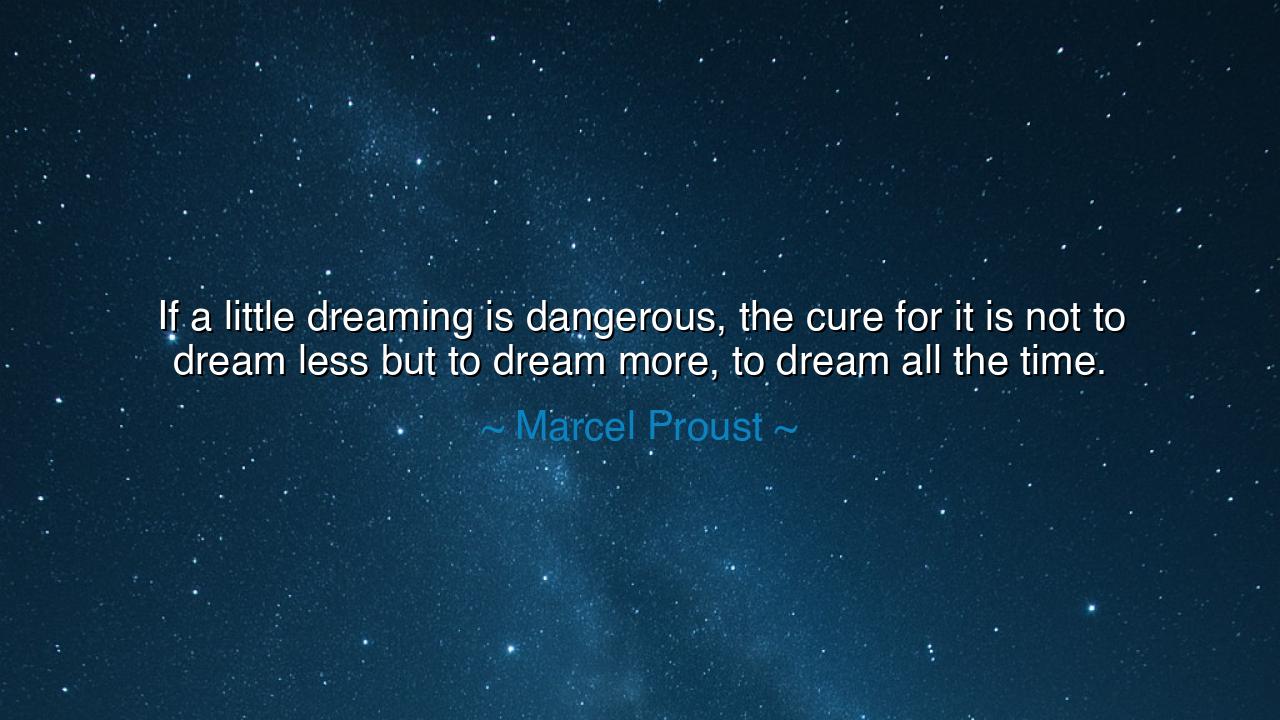
If a little dreaming is dangerous, the cure for it is not to
If a little dreaming is dangerous, the cure for it is not to dream less but to dream more, to dream all the time.






Hear the radiant words of Marcel Proust: “If a little dreaming is dangerous, the cure for it is not to dream less but to dream more, to dream all the time.” These words, flowing like a river of paradox, carry within them a profound truth about the nature of vision and imagination. For Proust does not condemn the dream as weakness, nor does he warn against its risks. Instead, he proclaims that the only danger lies in dreaming too little, in allowing vision to flicker without flame. If a small dream unsettles the spirit, then let the heart embrace larger ones, until life itself becomes the realm of eternal dreaming.
The ancients understood this well. The philosopher Plato spoke of the soul as being drawn toward higher realities, toward ideals that could not yet be touched by human hands. These ideals were the dreams of eternity, guiding men beyond the limitations of their daily lives. To dream a little was to see only fragments and to grow frustrated by longing; but to dream greatly, continually, was to lift the spirit into a realm where vision and destiny joined as one. Proust’s words are but a modern echo of this timeless call: do not restrain your dreams, but multiply them until they shape the very air you breathe.
Consider the story of the Wright brothers, who first dreamed of flight. Had they only dreamed a little, they might have abandoned their vision at the first crash, the first laugh of mockery, the first failure of wings. But they did not retreat into smaller dreams—they dreamed more, they dreamed always, until the skies themselves yielded to their persistence. Their story shows that what may seem dangerous in a small measure—risk, failure, ridicule—becomes strength when sustained by constant, unwavering dreaming. Their dream consumed them, and in that fire, the modern world was born.
Proust also reminds us that fear of dreaming too much is a prison of the spirit. Many are told to be “realistic,” to aim small, to avoid disappointment. Yet such caution kills the soul long before death arrives. A little dream unfulfilled leaves the heart restless; but the soul consumed with dreaming finds in every failure a new beginning, and in every setback, another chance to ascend. Thus dreaming is not dangerous when embraced fully—it is dangerous only when we taste it halfheartedly and then retreat.
Yet let us be clear: Proust does not speak of idle fantasies, but of dreams that become the substance of living. To dream all the time is not to escape reality, but to enlarge it, to weave vision into every action, every word, every choice. The dreamer who never ceases becomes the creator, the builder, the pioneer. This was the wisdom of the prophets, the poets, and the inventors: they did not dream only at night, but with open eyes, until the boundaries between vision and reality dissolved.
The lesson is this: do not fear to dream. If your heart is stirred by longing for greatness, for beauty, for justice, for creation—do not silence it. Let it grow. Let it burn. Dream more, not less. Let the dream take root in your thoughts, your actions, your very breath. For the cure to the disappointment of small dreams is not to abandon them, but to embrace greater ones that sustain you even through hardship.
So let Proust’s words be remembered as a clarion call: “Dream more, dream all the time.” Do not shrink in fear, but live in the vastness of vision. Let your life itself become a dream pursued without ceasing, for in this lies both power and peace. And when others warn you of danger, remember that the true danger is not in too much dreaming, but in too little—for a small dream dies, but a great dream, pursued always, becomes eternal.






AAdministratorAdministrator
Welcome, honored guests. Please leave a comment, we will respond soon